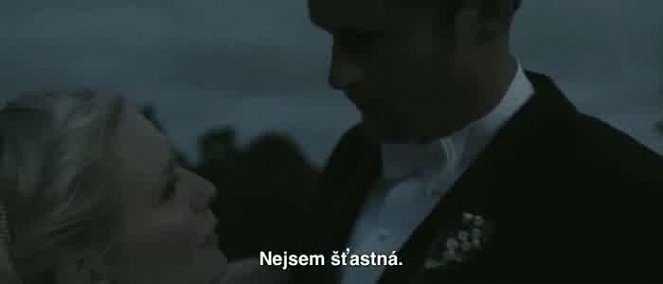Directed by:
Lars von TrierScreenplay:
Lars von TrierCinematography:
Manuel Alberto ClaroCast:
Kirsten Dunst, Charlotte Gainsbourg, Kiefer Sutherland, Charlotte Rampling, Udo Kier, Alexander Skarsgård, Stellan Skarsgård, John Hurt, Jesper Christensen (more)VOD (5)
Plots(1)
Melancholia is Lars Von Trier's first movie since the widely recognised yet supremely controversial Antichrist. The story is focused on Justine (Kirsten Dunst), who has just arrived at her sister Claire's beautiful mansion for what should be the most exciting day of her life... her wedding. However, as the evening approaches Justine's ‘happy day' turns out to be a harsh wake-up call to some of the troubles in her life that desperately need confronting. As Justine battles her demons a new sense of fear is brought into her life when she learns that a planet named Melancholia is rapidly making its way to Earth. With the knowingness of certain death entering the minds of Justine and Claire they struggle to keep their composure and dark secrets are finally brought to light in what proves to be an epic finale. (Artificial Eye)
(more)Videos (2)
Reviews (12)
The first, not very exciting (worthy of three-stars) half is excellently acted, with a nice variety of international stars in supporting roles. However, it doesn’t bring anything more to the table than any conversation scene from any of Trier’s (or Ozon’s) other films. The second (four-stars), more oppressive, more impressive, visually beautiful half of the film, which is also more interesting in terms of the script, intensifies the experience, resulting in the audience being dazzled by the artistic audiovisuals but perplexed and unfulfilled by the content. It’s as if Trier was just experimenting, trying to materialize a feeling, an idea from a short verse. For some, it may be an interesting and clever meditation (after all, it is an extremely elegant game with pictures, music and characters), but for me Melancholia remains only a handful of positive impressions rapidly fading away after the end credits.
()
This is one destruction of the planet that I actually want to see as a movie. And it’s just as powerful as I had imagined. The human perspective gives the circumstances a certain authenticity and the limited cast in the second half also makes the atmosphere suitably intimate. At the same time, the first “wedding" part comes across like a sarcastic view of various character faults, but maybe it was simply meant to make us feel better, that nobody is perfect and maybe that everybody gets what he/she deserves. Excellent casting, with a weird, but utterly perfectly unstuck Kirsten Dunst and a perfect Kiefer Sutherland who gives a great performance of the only normal (or at least the only character I could identify with) character and spends his time drawing any attention to himself, but as soon as Melancholia comes along, it sweep them all from the surface of the Earth. Amazing escalation. The earth is evil.
()
My first meeting with Lars von Trier went very well. After the breathtaking introduction I was sorry I didn't catch Melancholia in the movie theatre. After the first part I was delighted and after the following part I was slightly confused but still extremely satisfied. The combination of handheld "earth" camera, "space" views (of which there are not many), music (Wagner!) and perfect acting performances (with the unbeatable Kiefer Sutherland in the lead) was a success. I probably didn't understand everything, but that's why I'll gladly watch the film again in the future.
()
It’s impossible to prepare oneself for Melancholia and the end of the world. Von Trier manages to capture that mood when there’s nothing you can do with a similar sense of urgency as Bergman. But he angers more people and additionally has Earth destroyed. Melancholia is a logical follow-up to Antichrist, which involved a clash between a man and a woman. This time, the clash is between two sisters, two approaches to life and ultimately two planets. The depressive Justine passively accepts her fate. She knows that she can’t change anything. At the same time, she represents extreme individualism. She would rather stay at home alone than submit to social conventions. Claire cares more about others. She doesn’t resign herself to the situation, but she wants to have it under control. Only at the end they switch roles and one finds understanding for the other. In its own way, it is a happy ending that, at the same time, shows how we spend our whole lives running away from the thought of death into magical caves, which can take different forms for everyone, but in the end they are of little help. Melancholia is also a biting polemic on American disaster movies, which conversely try to convince us that tragedy can be averted with human action and ingenuity (and Bruce Willis). Instead of a saviour, von Trier only offers two possible ways to accept the inevitable. On top of that, he forces us to spend the last hour before the end of the world with decadent representatives of high society who are definitely not bearers of noble qualities and have enough problems of their own. He thus doesn’t offer many reasons to wish for the end not to come, which I find more honest than the Hollywood approach. 85%
()
They should have cast Bruce Willis instead of Sutherland; only with that savior of our plant “asteroid my ass" would Trier throw an ironic grin at the audience; Jack Bauer is just too little time for something of that caliber. But seriously, now... A surreal “music video" of Wagner, Forman-style wedding and Trier in an intimate, emotional, but still visually most powerful ever end of the world. Several parts of it really manage to get across that specific atmosphere and the feelings typical for states of melancholy which you see/experience very rarely in movies.
()



Ads